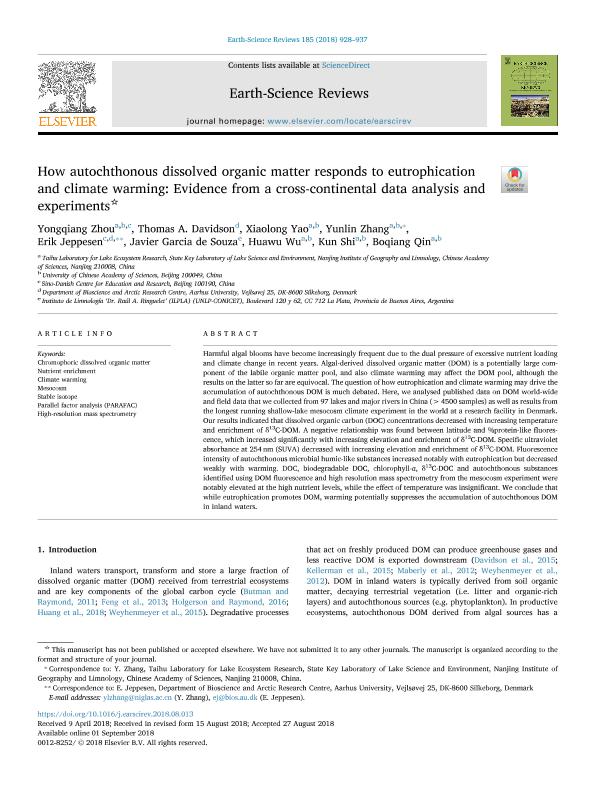Artículo
How autochthonous dissolved organic matter responds to eutrophication and climate warming: Evidence from a cross-continental data analysis and experiments
Zhou, Yongqiang; Davidson, Thomas A.; Yao, Xiaolong; Zhang, Yunlin; Jeppesen, Erik; Garcia de Souza, Javier Ricardo ; Wu, Huawu; Shi, Kun; Qin, Boqiang
; Wu, Huawu; Shi, Kun; Qin, Boqiang
 ; Wu, Huawu; Shi, Kun; Qin, Boqiang
; Wu, Huawu; Shi, Kun; Qin, Boqiang
Fecha de publicación:
10/2018
Editorial:
Elsevier Science
Revista:
Earth-science Reviews
ISSN:
0012-8252
Idioma:
Inglés
Tipo de recurso:
Artículo publicado
Clasificación temática:
Resumen
Harmful algal blooms have become increasingly frequent due to the dual pressure of excessive nutrient loading and climate change in recent years. Algal-derived dissolved organic matter (DOM) is a potentially large component of the labile organic matter pool, and also climate warming may affect the DOM pool, although the results on the latter so far are equivocal. The question of how eutrophication and climate warming may drive the accumulation of autochthonous DOM is much debated. Here, we analysed published data on DOM world-wide and field data that we collected from 97 lakes and major rivers in China (> 4500 samples) as well as results from the longest running shallow-lake mesocosm climate experiment in the world at a research facility in Denmark. Our results indicated that dissolved organic carbon (DOC) concentrations decreased with increasing temperature and enrichment of δ13C-DOM. A negative relationship was found between latitude and %protein-like fluorescence, which increased significantly with increasing elevation and enrichment of δ13C-DOM. Specific ultraviolet absorbance at 254 nm (SUVA) decreased with increasing elevation and enrichment of δ13C-DOM. Fluorescence intensity of autochthonous microbial humic-like substances increased notably with eutrophication but decreased weakly with warming. DOC, biodegradable DOC, chlorophyll-a, δ13C-DOC and autochthonous substances identified using DOM fluorescence and high resolution mass spectrometry from the mesocosm experiment were notably elevated at the high nutrient levels, while the effect of temperature was insignificant. We conclude that while eutrophication promotes DOM, warming potentially suppresses the accumulation of autochthonous DOM in inland waters.
Archivos asociados
Licencia
Identificadores
Colecciones
Articulos(ILPLA)
Articulos de INST.DE LIMNOLOGIA "DR. RAUL A. RINGUELET"
Articulos de INST.DE LIMNOLOGIA "DR. RAUL A. RINGUELET"
Citación
Zhou, Yongqiang; Davidson, Thomas A.; Yao, Xiaolong; Zhang, Yunlin; Jeppesen, Erik; et al.; How autochthonous dissolved organic matter responds to eutrophication and climate warming: Evidence from a cross-continental data analysis and experiments; Elsevier Science; Earth-science Reviews; 185; 10-2018; 928-937
Compartir
Altmétricas



